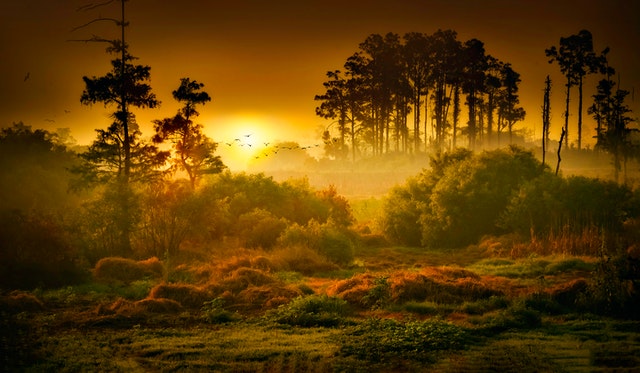A wind rises with the dawn as if the light is pushing at the fabric of the sky. A gray light at first, it’s less a presence of brilliance than a watering-down of night as the blackness grows impure. It’s a while before this devolution crosses a threshold beyond which it ceases to be the growing imperfection of what had been and becomes instead something new, something wonderful. Light, and not darkness diluted.
Against the eastern sky, the horizon is now a stark silhouette. Below: the black outline of a hill, trees standing proud upon its crest. Above, shades of yellow and gray, the glitter of stars only visible at the heavens’ apex and further west. The garden spills down the descending slope, still mostly cloaked in shadows. Only really visible as texture save where white flowers stand out shockingly, the pale stripes on a hostas’s leaves impenetrable hieroglyphs against the darkness.
The aforementioned wind is soft and tickling, too retiring to be called fitful. It teases the garden when it’s blowing, rustling leaves and kicking up the bright, sharp scent of grass. It’s moist with dew, warm but not hot. You don’t need to consult a calendar to identify spring’s breath, this is a breeze you’ve known since childhood. It quickens the heart; it speaks to promise and rebirth.
As the light swells, the garden is revealed with greater clarity. There are no paths through it, no fountains or statuary. No benches where pedestrians rest their feet while they admire nature’s artistry. Had it not been so lush, the variety of plant life so diverse, you might have thought it natural. The landscaping isn’t obvious: nothing is grouped en masse or in patterns. The plantings are often cluttered, flowers growing so close their bobbing heads butted.
The wind dies off as the birth of a new day transmutes from premise to certainty. The sun nears the margin betwixt earth and sky, casting its illumination in advance to herald its coming. You can see the garden in greater detail, but pay less attention to it now.. As the breeze falls away, odors rise in its wake, the air no longer scoured clean.
What arises in its wake is sultry, voluptuous. Almost cloying in intensity. The competing scents of a thousand flowers are beaten back, the acid humor of verdure and rich soil-scent overwhelmed. This smell is infinitely more powerful than anything trying to compete with it. It’s immense, even domineering, as if it is a living thing. A titan from a different era.
The smell is everywhere, permeating everything as stillness settles upon the garden. The sun has broken free from the horizon so that it can warm the air, and the scent steams from the soil as if the world itself is sweating. And as the infant day progresses, increasing notice is being taken. Beyond that liminal hill, bells begin to ring, first one, then many.
You can’t see the settlement and can only intuit its presence. Add to the nothing you know the presumption that its inhabitants have the metallurgy sufficient to accomplish the forging of bells, of which there are now countless giving voice. Some are high-pitched, giddy carillons, silver-throated. Others sounded a solemn cadence, bass and audibly massive. Taken together, the impression they convey is exuberance.
You expect for this joyous din to presage something. Specifically the appearance of the people causing it. They should arrive in trains, pilgrims singing hymns and casting flower petals in fluttering rainbows over their heads as they come to pay reverence to whatever they’re so excited about. The days just keeps growing brighter, though, as the people fail to appear.
When change finally comes, you almost don’t notice at first, so understated is it. It comes, not as people in their multitudes, but a pair of doves. Small, cinerous, unremarkable, as all doves are. They are, you realize, the first living creatures you’ve seen. This might be a world without animals, if not for the bells and the essential ecological impossibility.
The doves alight in the branches of a tree at the base of the hill. The center of the garden, more or less. Now you’ve noticed it, it’s hard to fathom how you failed to earlier. It doesn’t tower over its fellows, but still it has a grandeur to it. It’s shaped like an umbrella, broadest at the lowermost tier of limbs, trunk tall, smooth, nutmeg-hued. Its leaves are large, shape like the head of a spear and just as sharp, shading from a prasinous green at the base to a jaunty blend of yellow and orange at the crown, giving the whole a resemblance to a citrus basket.
Amidst the boughs and crowning the crown are golden orbs only starting to unfurl as the sun warms them. As the white flowers open one after the next, bursting outward like so many popping bubbles, you realize they’re the source of the smell. The heady boudoir smell, and the reverence. The doves have come to roost upon her limbs and take up singing, adding their melancholy minor coos to the bells’ brazen ringing.
Finally, you understand: She is flowering, and soon She will bear fruit.
THE END
Note from the author: Back in undergrad I purchased from an art fair a pottery tile. The artist had painted a selection of vegetables arranged in such a way as to resemble a female nude lying on her side, seen from the rear. Beneath this striking image, the words: Reclining Salad. As objets d’art went, I thought that was pretty nifty, and it turned out my parents were taken with it, too.
Ever since, they’ve been bringing back tiles from their travels to add to my collection. The tiles range from abstract images to human figures, all of them necessarily small. Evocative, for such modest works of art. In this series, I’ll be writing a short story for each, my very own miniature Pictures at an Exhibition.

Comments are closed